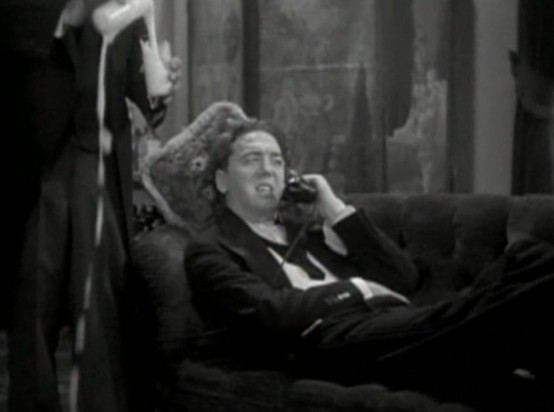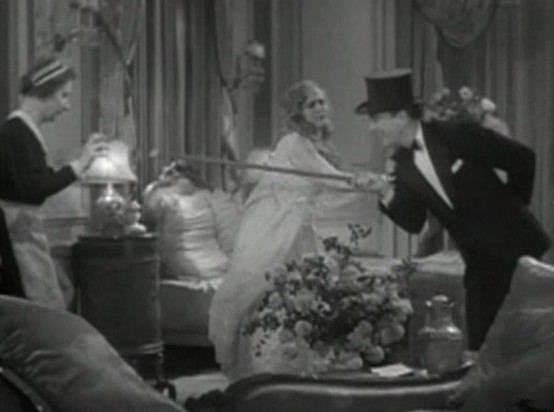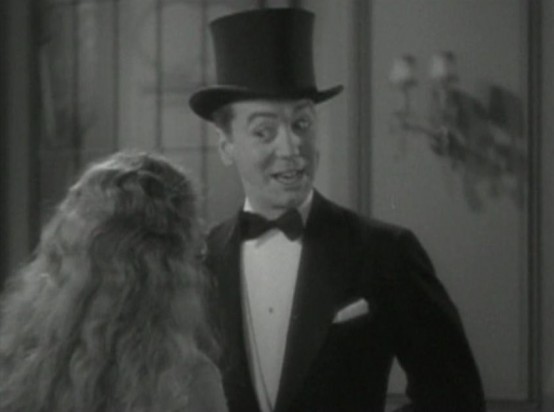It was while watching Expensive Women (1931) that I first took notice of Joe Donahue. I had put the movie on because it’s Warren William’s earliest existing talkie, and you should know by now I’m a big Warren fan, but it was Donahue’s stumbling Bobby Brandon who caught my attention this time. Dolores Costello starred and was underwhelming as she was being courted by suave William, absent later caddish impulses, and bland Anthony Bushell, leaving boisterous Donahue to steal the movie.
Who was Joe Donahue?
The IMDb reveals that he only ever appeared in four movies, each of them First National Pictures and, happily, each already a part of my collection. Expensive Women was his final film, preceded by his debut, at star Marilyn Miller’s request, in Sunny and then less important roles in two Dorothy Mackaill titles, Party Husband (1931), in which Donahue offers a toast and then disappears, and The Reckless Hour (1931), which he hung in throughout, but mostly at Joan Blondell’s side and not Mackaill’s.
After a perusal of a few old issues of Film Daily, greatly aided by the Lantern Search Engine, you can safely add the 1932 Mack Sennett short The Boudoir Butler (1932) to that list as well. A “Joe Donohoe” is listed in those credits on the IMDb, though earlier tonight I filed a correction (as I did for some other Donahue related info).
The next mystery concerned Donahue’s death. The IMDb doesn’t list a date. Neither does anyplace else. Donahue was born January 3, 1899. He has to be gone, right? Yes, he’s been gone awhile. And that chase led to this post.
Joseph Arthur Donahue was the fourth of six children born to Irish immigrants Dennis Donahue (1863-1922) and Julia (Buckley) Donahue (1863-1940). The elder Donahues both arrived from Ireland in 1880 and were married in 1888. While all of their children would have a talent for dancing, neither parent did. At the turn of the century Dennis would list his profession as boilermaker.
It was eldest son Jack Donahue who made the family name as a “hoofer-comedian.” Beginning with amateur nights in Boston, Jack soon worked his way across the country in vaudeville before scoring on Broadway where he eventually commanded a salary of $5,500 a week plus a percentage of his shows. On top of that he earned royalties as a playwright and for magazine articles, including a comic series in Cosmopolitan. Jack made his Broadway debut when A.H. Woods cast him in a comedy part in 1912’s The Woman Haters. He burst to stardom in the Ziegfeld Follies of 1920 where he teamed with Ray Dooley and lashed out on his own with a highly regarded impersonation of John Barrymore. But it was Jack’s association with Broadway star Marilyn Miller that would bring him his greatest success—and his brother too.
 Between 1925 and 1928 Jack Donahue co-starred with Miller in back-to-back hits Sunny and Rosalie. Jack had married a former dance partner, Alice Stewart, and fathered three daughters. The youngest was named Marilyn and co-star Miller served as her godmother.
Between 1925 and 1928 Jack Donahue co-starred with Miller in back-to-back hits Sunny and Rosalie. Jack had married a former dance partner, Alice Stewart, and fathered three daughters. The youngest was named Marilyn and co-star Miller served as her godmother.
Joe Donahue, meanwhile, was said to launch his dancing career at age 12 (though at 19 on his draft registration card he listed his occupation as shipfitter at the Boston Navy Yard), often working with his older brother, with whom he was always compared. Joe became Jack’s understudy on Broadway as was said to have occasion to substitute for him in Angel Face (1919-20), Always You (?) and, most significantly, for two weeks during Sunny opposite Miller.
In late September 1930 Jack Donahue collapsed in Cincinnati. The cause was given as overwork with mention of sinus and kidney complications. He died of heart disease in his Central Park home, October 1, 1930. Jack Donahue was just 42 years old.
Younger brother Joe was closer to Jack than anyone besides his wife and mother. A year and a half after Jack’s death, in March 1932, the Hollywood Filmograph reported that Joe left the Carthay Circle Theater in tears at intermission because he could not bear to watch another actor perform the part his older brother had written and played in Sons O’ Guns.Whether he knew it or not, Joe Donahue’s own movie career was over by that time. Why his career ended I was not able to discern, but Donahue continued working on vaudeville after Hollywood was done with him.
Joe was originally beckoned to the screen when Jack’s old partner Marilyn Miller called upon him to fill his brother’s shoes in the screen adaptation of their Broadway smash Sunny (1930).
It was quite the debut! Joe Donahue was billed third behind Miller and leading man Lawrence Gray, but playing the same part that Jack had enacted on stage actually placed Joe on screen as much as anyone but the star. Jim Denning would be Joe’s most sympathetic character on screen, an innocent dope who gets engaged to his “Weenie” (Inez Courtney) after a kiss in England, but is forced to marry Miller’s stowaway Sunny, who didn’t have time to bother with a passport, on board the ship back to America. The plan, which Joe’s character goes through with only after ample amounts of alcohol, is for he and Sunny to divorce once she’s legally in the U.S. and then Sunny can turn her attentions back to Gray’s Tom Warren, who has Margaret (Barbara Bedford) attached to his hip during the ocean voyage.
Before their divorce can be arranged Jim assists Sunny as she practices dancing. This gave Joe Donahue, later billed in small towns as the “World’s Greatest Dancer,” his only two dance scenes in the movies. While he mostly positions himself to catch Miller throughout the first scene, the second finds them side-by-side doing a tap dance in which, quite honestly, revealed Miller as the standout of the pair.
After Sunny First National announced that Donahue would only play straight comedy roles, which, at least in retrospect, seems to indicate no more dancing.
He appeared in the opening scene of Party Husband as best man to James Rennie, who has just married Dorothy Mackaill. Donahue comes off as playful and modern as he offers a toast and more of less forecasts doom in his series of wisecracks. He fails to return.
Donahue fared better in his second Mackaill outing, The Reckless Hour, where his Harry Gleason found himself outclassed in his courtship of Dot by Walter Byron’s upper class snob and Conrad Nagel’s sophisticated artist. Donahue has to settle for Mackaill’s sister, played by Joan Blondell. Poor guy.
While he mostly mopes through The Reckless Hour alongside Blondell, Donahue, self-appointed “nature’s gift to the women of the world,” even gets to participate in the climax involving Mackaill, Nagel and H.B. Warner as the girls’ father, with Blondell in tow. What really stands out about The Reckless Hour is Blondell, already saucy, but Donahue holds his own trading wisecracks with her. It’s really a very charming lowbrow performance.
Speaking of lowbrow, Expensive Women came next, and last, for Donahue. From the opening scene, in which he emerges from the back of an ambulance ready to party, I really thought he was the class of the movie until his attitude and alcoholism manage to get him bumped off. In that first scene Connie Newton (Dolores Costello) is ready for bed when Donahue’s Bobby appears trying to rouse her out to party. She’s having none of it. “Connie’s going to bed,” she says, to which Bobby replies, “That’s swell. Been waiting two years to hear you say that!”
She finally caves to Bobby’s charm and accompanies him to the party, but winds up hiding in a bathroom and ditching him for Warren William. From there Donahue’s Bobby Brandon is liquored up a little more each time we see him. He gets into a scrape with William at another party, but Warren handles him with finesse and sends him happily on his way. The same can’t be said of his New Year’s Eve blow-up with Costello and Anthony Bushell.
Joe Donahue’s last feature appearance came falling face first to the carpet.
After that it was back to vaudeville where Joe was billed as the “World’s Greatest Dancer,” “Marilyn Miller’s Sunny Co-Star,” and, for the rest of his career, “Jack Donahue’s Little Brother.”
I don’t know what happened to push Donahue out of Hollywood, but from what survives on screen there’s little doubt that he was up to the task. He quickly came to remind me of an early model of Dan Dailey, especially after I finally got to see him dance in Sunny.
But other than a few ads for those vaudeville appearances Joe Donahue disappears from the press after about 1932. He was mentioned in his mother’s 1940 obituary and, this one was frustrating, mentioned as being deceased in younger brother Walter’s 1966 obituary.
How, when, where did Joe Donahue die? Well, I’ve got the when and the where.
From the Boston Globe, January 4, 1943:
Donahue — In Charleston, Jan. 3. Joseph A., beloved son of the late Dennis and Julia Donahue (nee Buckley). Funeral from the Daniel A. Wiles Funeral Home, 3 Dexter Row. Tuesday, Jan 5 at 9:15 am. Requiem High Mass at St. Mary’s Church at 10 am. Relatives and friends are kindly invited.”
That’s our Joe. That’s also a vague obituary for a hometown star, who received no additional mention in the Globe and none whatsoever in the nearby Lowell Sun. Joe was mentioned in obituaries for mother Julia in 1940 and brothers Jack, in 1930, and Walter, in 1966. Walter, who played in the 1951 revival of Okalahoma! on Broadway, had survived Joe as did at least one sister, Mrs. Alice Hookway, who appeared in a newspaper article dated 1977 that took care to mention each of her brothers by name.
Given the date of Joe’s death, his 44th birthday, and any lack of military rank during that war year, my suspicion is that he took his own life.
I also suspect there’s more to the story of his Hollywood exodus, but I don’t know if there is anyone is left who can solve that riddle. It’s a shame that such a talented comic dancer would only have a shot at a musical that came too early and miss out on all of the spectacular Warner Bros.-First National musicals to follow throughout the 1930s.
To the best of my knowledge Joe Donahue, 1899-1943, was unmarried (confirmed through 1931) with no children.
Screen captures were taken from my Warner Archive copy of PARTY HUSBAND and from recordings off of Turner Classic Movies for the other three features Donahue appeared in.
As of this date all but EXPENSIVE WOMEN can be purchased as Made on Demand DVDs from Warner Archive.
Thanking you in advance for your purchase of any of these Joe Donahue titles through my affiliate links: SUNNY, THE RECKLESS HOUR and PARTY HUSBAND. The latter two titles are each part of two-movie Dorothy MacKaill collections.
Sources
- ”Another Good Dancer.” Lowell Sun 16 Oct 1930: 11. Web. Newspaper Archive 26 Nov 2013.
- ”Donahue.” Boston Daily Globe 4 Jan 1943: 14. Web. Boston Globe Archive 26 Nov 2013.
- Hollywood Filmograph 12 Mar 1932: 11. Web. Media History Digital Libary. 25 Nov 2013.
- “Jack Donahue Dead in New York Home.” Boston Daily Globe 2 Oct 1930: 4. Web. Boston Globe Archive 26 Nov 2013.
Various additional newspapers were used to check and double-check facts through search engines such as Google News, Boston Globe, Old Fulton NY Post Cards and NewspaperArchive.com. Original historical documents accessed are all from FamilySearch.org and directly linked throughout the piece when mentioned.


















I am a HUGE Marilyn Miller fan, so I was just thrilled to read your post! Well done and thank you!
Thank you, Marsha! Well, at least somebody will have recognized this guy then! I was very surprised by how big his role was in Sunny. I would love to know why he only stuck around for four movies. I really could picture him adding something to several early to at least mid-30s WB-First National titles.
Cliff –
I was thrilled to find your very detailed post about Joe Donahue. I’ve only come to learn about the Donahues recently – in the last several years I’ve been researching my family and I discovered within the past year that my great-grandfather, Patrick Buckley, was Julia Donahue’s brother.
You may be right about Joe’s demise, but a lot of Buckley men of that era died pretty young, mostly due to heart disease, so it may also have been due to natural causes.
Hi Tony – Patrick Buckley was also my great-grandfather. No question Buckley men and women died at unusually young ages then, though previous generations seemed to live longer… Can we connect? timbuckley1@hotmail.com. Thanks to Cliff for this great info on Joe Donahue, my first cousin, twice removed
Hi Tony,
I’m so happy I had this post waiting here for you!
I agree, it’s entirely possible Joe died of natural causes and I kind of hedge on that as a possibility simply because Jack died so young. What makes me more suspicious than even the coincidence of dying on his own birthday though is the sparse attention his death received in the press without even any mention of any other surviving family members by name.
Definitely admit all of my evidence is circumstantial though.
Glad you enjoyed the post, thanks!
Cliff
Just discovered this fantastic site. Like Marsha I am a huge M.M. fan
but I remember when watching “Sunny” I was bowled over by Joe
Donohue – just loved that “gymnasium” dance they performed on the
boat. Early talkie cinema seemed to be dotted with fascinating dancers
and performers who had their fame and then disappeared. I was
just blown away by Al “Rubberlegs” Norman – he only made a few
movies – all around 1930 and then “Cover Girl” – I actually managed
to pick him out of the chorus line.
Hi Diane,
Glad you found me! Donahue is so relaxed in that gymnasium scene, practically comatose, moving across the floor and catching Miller. So glad he got to do his own few steps too, otherwise his dancing would be lost to time–that’d be a shame for someone billed as “World’s Greatest Dancer,” even if the title is a bit of an exaggeration!
Thanks for your comment!
Cliff
Joe Donahue was a talentless, fatheaded vaudeville goon who could barely put two steps together. He was past his corny vaudevillian stage routine when the talkies broke. He delivered all of his humorless lines as if he was on a vaudeville stage, a perfect example of a ham always attracting attention to himself to the detriment of the production. In cinematic terms he was the very definition of “creaky.”